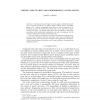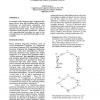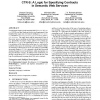134
click to vote
AI
2008
Springer
15 years 21 days ago
2008
Springer
Although classical first-order logic is the de facto standard logical foundation for artificial intelligence, the lack of a built-in, semantically grounded capability for reasonin...
CORR
2008
Springer
15 years 2 months ago
2008
Springer
Abstract. Continuous first-order logic is used to apply model-theoretic analysis to analytic structures (e.g. Hilbert spaces, Banach spaces, probability spaces, etc.). Classical co...
135
click to vote
ACL
1990
15 years 3 months ago
1990
In contrast to the "designer logic" approach, this paper shows how the attribute-value feature structures of unification grammar and constraints on them can be axiomatiz...
104
click to vote
CLIMA
2004
15 years 3 months ago
2004
Abstract. We present an encoding of a sequent calculus for a multiagent epistemic logic in Athena, an interactive theorem proving system for many-sorted first-order logic. We then ...
136
click to vote
AMAST
2006
Springer
15 years 5 months ago
2006
Springer
Algebraization of computational logics in the theory of fork algebras has been a research topic for a while. This research allowed us to interpret classical first-order logic, seve...
119
click to vote
WWW
2004
ACM
16 years 2 months ago
2004
ACM
A requirements analysis in the emerging field of Semantic Web Services (SWS) (see http://daml.org/services/swsl/requirements/) has identified four major areas of research: intelli...



